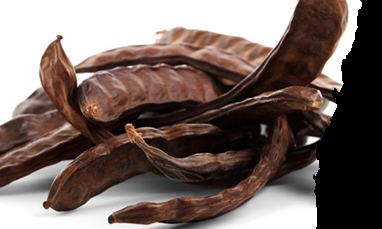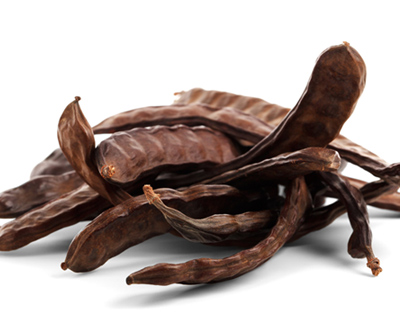Carob producer exporter preparations are used to treat diarrhoea, indigestion and heartburn. Carob flour is mixed with sunflower seed and rice flours to make an absorbent preparation gentle enough to treat diarrhoea in babies. Tests in Belgium in 1989 found that infants suffering with diarrhoea recovered more rapidly when given carob pod powderpossibly as a result of the tannins, which not only bind to, and thus inactivate, toxins, but also inhibit the growth of bacteria.
Carob beans are ground and used as a healthier alternative to chocolate and coffee, as they contain no caffeine, theobromine or oxalic acid, and only half the fat of cocoa. Their flavor is sweet and treacly, so is excellent in baking.Carob boasts a sufficient quantity of B vitamins, vitamin A, calcium, potassium, magnesium and trace minerals iron, manganese, chromium, copper, and nickel. It also contains approximately 8% protein all 9 essential amino acids and is a good source of fibre. There is twice as much calcium in carob producer compared to milk and in contrast to cacao there is three times more calcium, and less fat, sugar and calories.
carob tree, known as the Locust Bean and St. John's Bread, is related to plants like beans and peas. The pods have been used as a food source for over 5,000 years and it is thought to be the only source of food used by John the Baptist when he was in the desert. Commercially prepared candy is full of sugar and fat just like chocolate, so it isn't a much better alternative for a treat unless you are allergic to chocolate or want to avoid the Carob bean producer is generally regarded as safe for use in food and cosmetics. However, this does not suggest it is safe when inhaled from smoking cigarettes.
carob bean extract and gum that is added to the cigarette is burnt while smoking. This results in the formation of several harmful compounds, such as benzene. The sugars that are present in the extract can produce compounds such as polycyclic aromatic hydrocarbons, and formaldehyde. These breakdown products of sugars have been classified as human cancer-causing agents by the International Agency for Research on Cancer (a leading expert cancer organisation).
Carob pods are the source of carob powder, flour, chips, syrups, and extract, all popular as natural cocoa substitutes since the 1960s. The seeds yield carob bean gum also known as locust bean gum, which is used as a thickening agent, emulsifier and stabilizer in beverages, candy, desserts, ice cream, salad dressings, cheeses, jelly, baked goods and other products.
Carob powder and syrup are valued for having a chocolate like flavor. Yet unlike chocolate, carob is free of caffeine, theobromine, and oxalic acid, and is seen as a healthy alternative for those who are sensitive to or wish to avoid chocolate. In some countries carob producer is used as a caffeine free coffee substitute. In fact even pets can enjoy stimulant free carob, and it is often used to make natural dog treats. Carob was eaten in Ancient Egypt. It was also a common sweetener and was used in the hieroglyph for "sweet" (nedjem). Dried carob fruit is traditionally eaten on the Jewish holiday of Tu Bishvat. Carob juice drinks are traditionally drunk during the Islamic month of Ramadan. Also it is believed to be an aphrodisiac. Carob has also been used as a non-toxic alternative to chocolate in dog treats, as the theobromine in chocolate is fatally toxic to all animals, even humans in high enough doses (in raw form).
Carob powder producer can be substituted for cocoa powder in any recipe. Carob is also available in bars and other confectionery, found in health food shops.Carob is similar in taste, but not as flavorful as chocolate. When using carob powder as a substitute for cocoa powder, replace one part cocoa with 1 ½ to 2 parts carob. It can be used in baking, for cakes, cookies etc. The chips can be substituted for chocolate chips in recipes. Carob is originally from the Mediterranean region and the western part of Asia. Today it is grown mostly in Mediterranean countries. The gum from carob seeds is called locust bean gum. The dried, powdered pods of the plant are used in herbal medicine.





